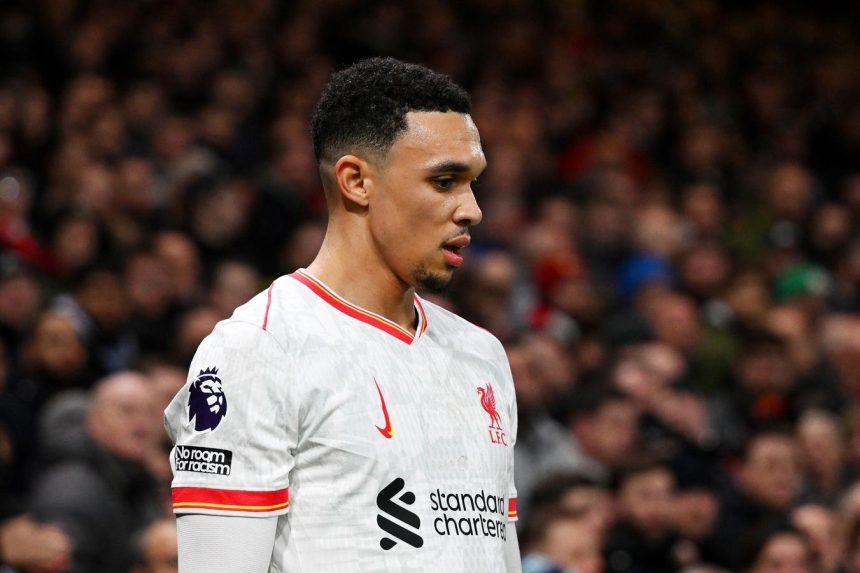Trent Alexander-Arnold’s potential departure from Liverpool in 2025 presents a complex scenario for both the player and the clubs involved. While the allure of Real Madrid is undeniable, a deeper analysis reveals that this move might not be the ideal fit for Alexander-Arnold. His strengths lie in his exceptional attacking prowess and creative playmaking, while his defensive vulnerabilities could be magnified in Real Madrid’s tactical setup. This juxtaposition of talent and potential weakness forms the crux of the dilemma surrounding his future.
Alexander-Arnold’s attacking contributions are undeniable. He is a world-class passer, capable of dissecting defenses with pinpoint accuracy and unlocking opportunities for his teammates. His vision and ability to deliver both short, incisive passes and long, raking balls make him a potent offensive weapon. He’s often been the creative hub for Liverpool, instigating attacks from deep and contributing significantly to their goal-scoring exploits. At Real Madrid, a team renowned for its attacking firepower, Alexander-Arnold’s creativity could be a valuable asset, potentially adding another dimension to their already impressive attacking arsenal. He could even be deployed in a more advanced midfield role, utilizing his passing range to control the tempo and dictate play.
However, the defensive demands of playing for Real Madrid could expose Alexander-Arnold’s weaknesses. Real Madrid’s attacking philosophy, characterized by frequent forays forward, leaves their defense vulnerable to counter-attacks. This necessitates full-backs who are defensively sound and capable of tracking back diligently. While Alexander-Arnold possesses pace, his positional awareness and one-on-one defending have been questioned. In Real Madrid’s system, these shortcomings could be amplified, potentially leaving him exposed and undermining the team’s defensive stability. This tactical mismatch raises concerns about whether he could adapt to the defensive requirements of playing for a team that often prioritizes attack.
Liverpool’s current tactical setup under manager Arne Slot mitigates Alexander-Arnold’s defensive frailties. Slot’s system emphasizes control and possession, allowing Alexander-Arnold to flourish in an environment where his defensive duties are less pronounced. The team’s structure and the support provided by his teammates help mask his weaknesses, allowing him to focus on his attacking contributions. This supportive ecosystem allows him to thrive, maximizing his strengths while minimizing the impact of his defensive vulnerabilities. This contrasts sharply with the potential scenario at Real Madrid, where he might be exposed defensively and struggle to adapt to a more demanding tactical system.
The cultural shift from Liverpool to Real Madrid is another crucial factor to consider. At Liverpool, Alexander-Arnold is a local hero, a product of the club’s academy, and deeply connected to the city and its fans. He enjoys a special status and the unwavering support of the Anfield faithful. At Real Madrid, he would be just another star in a galaxy of “Galacticos.” While the prestige and global recognition are undeniable, the pressure to perform at the highest level is immense, and the competition for places is fierce. This change in environment could impact his performance and overall well-being, affecting his ability to settle in and consistently deliver at the expected level.
For Real Madrid, while the temptation to acquire a player of Alexander-Arnold’s caliber is understandable, they must carefully evaluate whether his attacking strengths outweigh his defensive liabilities. While his creative passing and offensive contributions could enhance their attacking potency, his defensive vulnerabilities could prove costly in high-stakes matches. Real Madrid’s current right-back, Dani Carvajal, is injured, creating a void that needs filling. However, a short-term solution to address the right-back position shouldn’t overshadow the long-term implications of signing a player who might not be the ideal tactical fit.
Ultimately, Alexander-Arnold’s decision will be a complex equation balancing ambition, personal growth, and tactical suitability. The lure of playing for Real Madrid, a club steeped in history and success, is undoubtedly strong. However, he must carefully weigh this against the potential risks of joining a team where his defensive weaknesses could be exposed. Remaining at Liverpool, where he is a cherished figure and plays in a system that suits his strengths, represents a safer and potentially more fulfilling path. This decision will shape his career trajectory and define his legacy in the years to come. It’s a crossroads moment, demanding careful consideration and a clear understanding of his priorities and aspirations.



